Research - (2021) Volume 9, Issue 4
Assessing Depression and Quality of Life among Spouses of Persons Suffering from Alcohol Dependence Syndrome
*Correspondence: S Nambi, Department of Psychiatry, Sree Balaji Medical College & Hospital Affiliated to Bharath Institute of Higher Education and Research, India, Email:
Abstract
Alcoholism also called as alcohol dependence syndrome is defined as a cluster of physiological, behavioral, and cognitive phenomena in which the use of a substance or class of substances takes on a much higher priority for a given individual than other behaviors that once had greater value. Diabetes mellitus is a chronic multi systemic disease highly prevalent in India. It not only affects the person, but also the family members also who are burdened with the care- giving process of this disorder. The care- giving process for patients with diabetes mellitus is a complex one. It involves not only providing emotional support, but also practical arrangements like procuring and dispensing medications, monitoring blood glucose levels, helping in the management of the complications, and accompanying the patient for the requisite appointments. The spouses of persons with diabetes may feel stressed out, which might reflect in the care - giver having a poorer quality of life and symptoms of depression and psychological distress. The present study finds that the quality of life is poor in both the groups and is significantly poorer in wives of patients with Alcohol Dependence Syndrome. The physical quality of life and psychological quality of life is impaired in spouses of alcohol dependence syndrome persons compared to spouses of diabetes persons. The quality of life is significantly associated with the depression in both the groups.
Keywords
Alcohol dependence syndrome, Diabetes mellitus, Psychological, Monitoring blood glucose
Introduction
Alcohol use disorders are major cause of public health concern. Alcohol use causes both acute and chronic changes in almost all neurochemical systems. Heavy consumption causes not only physical, psychological and social disabilities resulting in Disability Adjusted Life Years (DALY) but also leads to death. Even in the absence of manifest physical illness, quality of life can seriously be compromised. The problem of excessive alcohol consumption is a major cause of public health concern in India and most of the countries. According to the World Health Organization (WHO) [1], Alcohol Use Disorders account for 1.4% of the global disease burden. The magnitude of the problem in our country is considerably high that India stands the second among the countries in the world, with 33% of its population consuming alcohol. According to the report by World Health Organization there is a substantial rise in consumption annually.
Alcohol Dependence Syndrome could be considered as a disorder of the family. It has deleterious consequences not only on the patient with Alcohol Dependence Syndrome but also on the members of the family. The relationship between an alcohol abuser and his family is complex. The families of alcohol dependence people face lot of difficulties where they experience guilt, shame, anger, fear, grief and isolation due to the presence of an alcohol abuser in the family. The wives of patients with alcohol use disorders are on most occasions the core members of the dysfunctional family system and are particularly affected given the intimate nature of their relationship and the constant exposure to the behavior of the alcoholic.
The spouses of alcoholics are more vulnerable to physical, social and psychological problems like separation, hostility, criticism domestic violence which leads to depression, adjustment disorder, anxiety, somatization thereby leading on to poor quality of life with psychological well- being comprised, spouses are likely to cope less efficiently thereby adversely affecting their social and functional roles as a mother, sister, homemaker etc.
Conflicts and poverty caused by husbands’ alcohol use can be the main cause of the wives’ suffering and can result in the wives losing meaning in their lives and experiencing despair and hopelessness which leads on to depression and impairment in quality of life in India, major depression was found to be around 43% among the spouses of alcoholics.
The quality of marital life in spouses of alcoholic persons reflect the understanding, satisfaction, rejection, affection, decision making, role functioning. Etc. The alcohol abuse decreases the marital satisfaction and leads onto poor coping patterns in the spouse thereby resulting in poor quality of life.
Thus, understanding and addressing the mental health issues of spouses of alcoholics will not only decrease their burden, improve their coping skills and overall quality- of-life, but is also likely to have a bearing on the treatment and outcome of alcoholics. There are many research reports on the coping behaviour, personality characteristics, quality of marital life, psychological distress and co dependence of wives of persons with alcohol use disorders. However, the psychiatric morbidity in wives of patients with Alcohol Dependence Syndrome is a largely neglected area in psychiatric research.
Diabetes mellitus is a chronic multi systemic disease highly prevalent in India. It not only affects the person, but also the family members also who are burdened with the care- giving process of this disorder. The care- giving process for patients with diabetes mellitus is a complex one. It involves not only providing emotional support, but also practical arrangements like procuring and dispensing medications, monitoring blood glucose levels, helping in the management of the complications, and accompanying the patient for the requisite appointments. The spouses of persons with diabetes may feel stressed out, which might reflect in the care - giver having a poorer quality of life and symptoms of depression and psychological distress [2-15].
Hence in our study we proposed to investigate the prevalence and severity of depression among spouses of alcohol dependent persons and their quality of life in comparison to spouses of diabetes patients and to correlate the sociodemographic & clinical variables.
Materials and Methods
100 Spouses of Alcohol dependence syndrome persons are taken as study group attending the psychiatric department and 100 spouses of Diabetes mellitus patients are taken as control group attending the general medicine of SBMCH. The spouses were in age ranging from 18 -60. The informed consent was taken from spouses of alcohol dependence syndrome persons and diabetes mellitus persons. Researcher started dissertation after getting approval from Institutional Ethical Committee. A specifically designed semi structured proforma was used to obtain demographic data for alcohol dependence persons with their spouses and diabetes mellitus persons with their spouses.
General Health Questionnaire was used for spouses of alcohol dependence syndrome and spouses of diabetes mellitus, for evaluating the distress produced in them. Hamilton Rating Scale for Depression was used to rule out depression among spouses of alcohol dependence syndrome persons and diabetes mellitus persons. WHOQOL was used to identify the quality of life in spouses of alcohol dependence syndrome persons and diabetes mellitus persons. Data was analysed with appropriate tools like Spearman’s correlation, Mann Whitney U test and student t test, chi square test.
Hamilton rating scale for depression
The Hamilton Rating Scale for Depression (HRSD), also called the Hamilton Depression Rating Scale (HDRS), abbreviated HAM-D, is a gold standard tool for rating depression in a clinical research. It helps to assess the severity of depression and enables to evaluate the recovery and has reliability & validity. It has 17 items (main) and score 4 items to provide additional clinical information which is not added to the total score. Scoring done on 3 /5 points scale and the total score is compared.
Scoring
99 A score of 0 - 7 is normal.
99 A score of 8 - 17 indicates mild depression.
99 A score of 18 -24 indicates moderate depression.
99 A score of 25 and above indicates severe depression.
It assesses the areas like mood, guilt feeling, suicidal ideation, insomnia, agitation/ retardation, and biological and somatic symptoms.
The general health questionnaire (GHQ)
The General Health Questionnaire (GHQ) is a screening tool to identify minor psychiatric disorders in the general population and within community or non- psychiatric clinical settings such as primary care or general medical outpatients.
The self- administered questionnaire focuses on two major areas:
The inability to carry out normal functions the appearance of new and distressing phenomena. It has 12 questions and areas assessed are like depression and anxiety. Suitable for all ages from adolescent upwards. It has sensitivity to short-term psychiatric disorders but not too long- standing disorders.
World Health Organization Quality of Life Scale - Brief Version (WHO QOL group 1998)
WHO QOL psychometric property of the brief version is comparable to the full version WHOQOL group 1998 isa26item self-administered questionnaire? It covers four domains.
Physical health (items 3, 4, 10, 15 - 18).
Psychological health (items 5 -7, 11, 19, and 26).
Social relationships (items 20 -22).
Environment (items 8, 9, 12- 14, 23 -25).
There are two items on general wellbeing (items 1 and 2).
Each item is scored between 1 and 5 except for items 3, 4 and 26 which are scored in a reverse manner. The scale has established discriminate validity, test and retest reliability and internal consistency.
Results and Discussion
GENERAL DEMOGRAPHICS
The study included spouses of 100 alcohol dependent men (cases) and spouses of 100 diabetic men (controls). The characteristics of patients and spouses are shown in Figures 1 and 2.
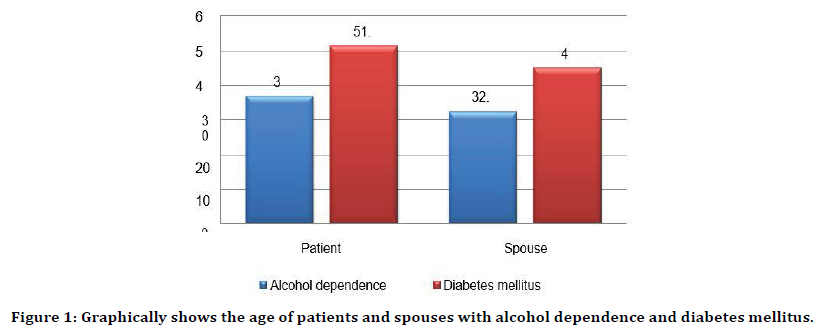
Figure 1. Graphically shows the age of patients and spouses with alcohol dependence and diabetes mellitus.
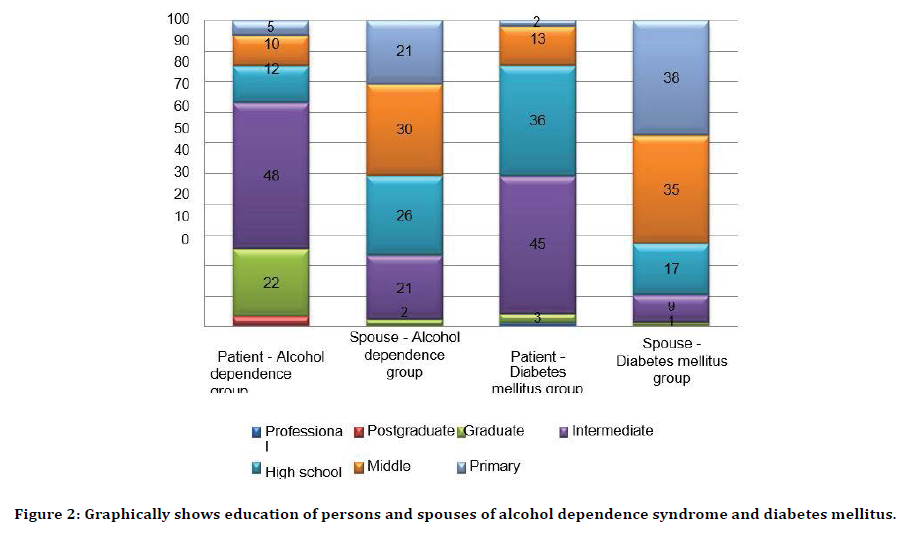
Figure 2. Graphically shows education of persons and spouses of alcohol dependence syndrome and diabetes mellitus.
The patients with alcohol dependence were younger, have higher education and employed in skilled work. Similarly, the spouses of men with alcohol dependence were more likely to be younger, have better education and be employed. Among the employed spouses of men with alcohol dependence, skilled workers were the most common, followed by unskilled workers.
The common characteristics of patients and their spouses of men suffering from alcohol dependence and diabetes mellitus are shown in Figure 3. The participants were largely from Hindu religion, and from semi-urban residence. The most common per- capita income group for the cases and controls was of Indian rupees 2001to 3000 per month. It was seen that the two groups did not differ with respect to religion, per- capita income and domicile (urban, semiurban or rural). However, the marriage was of longer duration among the diabetes mellitus group, probably reflecting the higher age of the patients and spouses in that group.
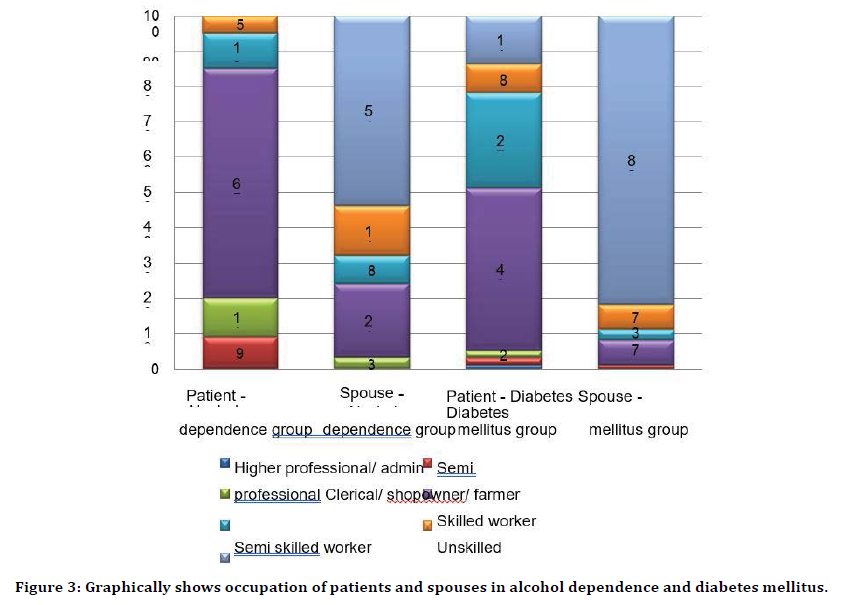
Figure 3. Graphically shows occupation of patients and spouses in alcohol dependence and diabetes mellitus.
At least one physical complication was present in 98 patients (98% of the sample) among the alcohol dependence sample. Among them, one physical complication was present in25patients, twoin61 patients, three in 11 patients and four complications in 1 patient. Similarly, 90 patients had atleast one neuropsychiatric complication, with one, two, three, four and five complications being present in 32, 43, 13, 1 and 1 patient respectively (Figure 4). The correlation of the Hamilton Depression Rating Scale and GHQ12 scores was assessed for spouses of men with alcohol dependence and men with diabetes mellitus (Figures 5 and 6). Among the spouses of patient’s alcohol dependent men, the correlation between HDRS and GHQ12 scores was strong (Pearson’s r=0.738, p<0.001). Similar strong correlation was observed in the spouses of men with diabetes mellitus (Pearson’s r=0.690, p<0. 001). This suggests that psychological distress and depressive symptoms concur together.
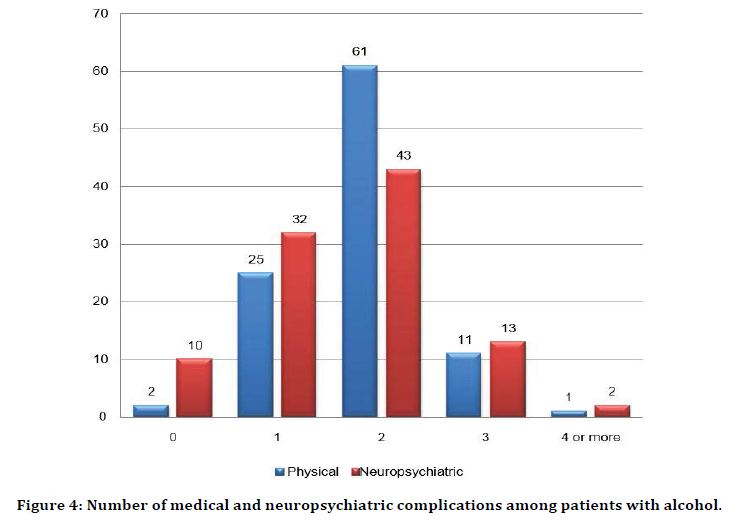
Figure 4. Number of medical and neuropsychiatric complications among patients with alcohol.
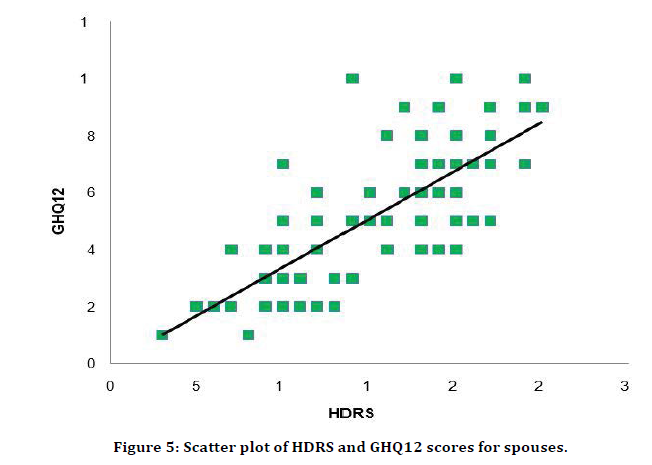
Figure 5. Scatter plot of HDRS and GHQ12 scores for spouses.
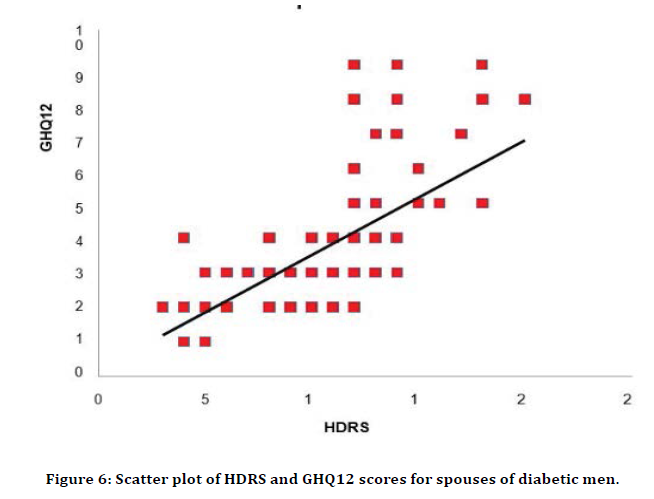
Figure 6. Scatter plot of HDRS and GHQ12 scores for spouses of diabetic men.
Quality of life
The quality of life across various domains among the spouses of men with alcohol dependence and men with diabetes mellitus are shown in Figure 7. It was seen that the quality of life of spouses of alcohol dependent men was poorer than the quality of life of spouses of diabetic men in terms of physical and psychological domains. The social quality of life of spouses of alcohol dependent men was better, while no differences emerged for environmental quality of life.
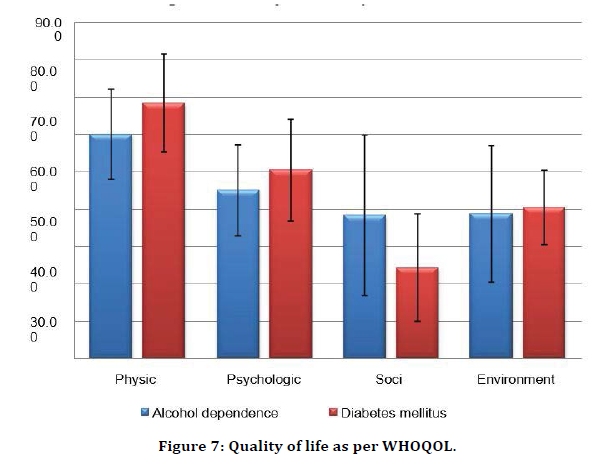
Figure 7. Quality of life as per WHOQOL.
The relationship of physical, psychological, social, and environmental quality of life domains with HDRS andGHQ12 among spouses of men with diabetes mellitus. It was seen that all quality-of-life domains correlated significantly negatively with HDRS and GHQ12, implying higher depression and distress scores were associated with a poorer quality of life. The quality of domains correlated well with each other, with all the correlations being highly significant (Table 1 and Table 2).
| HDRS | GHQ 12 | Physical QOL | Psychological QOL | Social QOL | |
|---|---|---|---|---|---|
| GHQ 12 | 0.738 (<0.001 )** | ||||
| Physical QOL | 0.502 (<0.001 )** | 0.52 (<0.001)** | |||
| Psychological QOL | -0.157 (0.120) | -0.040 (0.693) | -0.111 (0.273) | ||
| Social QOL | 0.014 (0.892) | 0.070 (0.491) | -0.039 (0.698) | 0.495 (<0.001)** | |
| Environmental QOL | -0.692 (<0.001)** | -0.606 (<0.001)** | -0.609 (<0.001)** | 0.293 (0.003)** | 0.238 (0.100) |
| ** p < 0. 01, QOL Quality of life | |||||
Table 1: Relationship of depression, psychological distress and quality of life among spouses of diabetes mellitus patients.
| HDRS | GHQ 12 | Physical | Psychological | Social | |
|---|---|---|---|---|---|
| GHQ 12 | 0.690 (<0.001)** | ||||
| Physical QOL | -0.603 (<0.001)** | -0.602 (<0.001)** | |||
| Psychological QOL | -0.479 (<0.001)** | -0.502 (<0.001)** | 0.792 (<0.001)** | ||
| Social QOL | -0.474 (<0.001)** | -0.577 (<0.001)** | 0.608 (<0.001)** | 0.554 (<0.001)** | |
| Environmental QOL | -0.428 (<0.001)** | -0.488 (<0.001)** | 0.659 (<0.001)** | 0.707 (<0.001)** | 0.516 (<0.001)** |
| ** p < 0. 01 | |||||
Table 2: Relationship of depression, psychological distress and quality of life among spouses of alcohol dependant men.
The relationship of quality-of-life domains with characteristics of patients with alcohol dependence and their spouses is shown in Table 3. It was seen that the physical quality of life correlated with the number of alcohols related neuropsychiatric conditions. The psychological and social quality of life did not correlate significantly with any of the patient or spouse related variables. The environmental quality of life correlated negatively with the education of the spouse, per- capita income, number of alcohols related physical complications and number of alcohols related neuropsychiatric complications.
| Variable | Physical QOL | Psychological QOL | Social QOL | Environmental QOL |
|---|---|---|---|---|
| Age of patient | 0.033 (0. 742) | 0.013 (0. 901) | 0.01 (0. 918) | -0.054 (0.592) |
| Education of patient | 0.1 (0. 322) | 0.055 (0. 588) | 0.178 (0. 077) | -0. 160 (0.112) |
| Age of spouse | 0.012 (0. 909) | 0.011 (0. 911) | 0.041 (0. 684) | -0. 020 (0.845) |
| Education of the spouse | 0.108 (0. 284) | -0. 084 | 0.02 (0. 842) | -0. 248 (0.013)* |
| Per- capita income | 0.247 (0. 013 )* | -0. 120 | 0.146 (0. 148) | -0. 448 (<0.001)** |
| Duration of the marriage | 0.013 (0. 901) | 0.008 (0. 936) | 0.074 (0. 463) | -0. 098 (0.332) |
| Duration of alcohol dependence | 0.001 (0. 992) | 0.004 (0. 969) | -0. 023 | 0.03 (0. 769) |
| Number of alcohol related physical complications | 0.101 (0. 318) | -0.157 (0.118) | 0.056 (0.581) | -0.257 (0.010)** |
| Number of alcohol related neuropsychiatric complications | 0.254 (0.011 )* | -0. 159 (0.115) | 0.059 (0. 557) | -0. 495 (<0.001)** |
| *p<0.05, ** p < 0.01 | ||||
Table 3: Relationship of quality of life with characteristics of patients with alcohol dependence and the spouses.
The spouses of alcoholics were younger when compared with spouses of diabetes mellitus. The education of spouses of alcohol dependence is up to middle class (30%) whereas spouses of diabetes is up to primary (38%) The educational status of spouses of alcoholics was better than spouses of diabetes mellitus. The spouses of persons with alcohol dependence syndrome were married for 6 -10 years and the spouses of diabetes mellitus patients were married for more than 20 years and the difference is statistically significant.
Nye et al. [16] found part time employed mothers to be the most satisfied with their daily work. Where in case unemployed spouses the percentage of depression is high. Both employed and unemployed woman are more suggestible to undergo depression but employed women faces distress both from family and from the workplace which eventually causes insomnia, tiredness, low mood.
54% of the spouses in both groups are unemployed; the spouses of alcohol dependent patients were more employed who are skilled workers (21 %) than spouses of diabetes mellitus patients. Peer et al. as reported by a study in which majority of the wives of patients with Alcohol Dependence Syndrome were unemployed because of their poor educational status [17].
Psychiatric morbidity
Depression in the spouses of alcohol dependent men and men with diabetes mellitus were assessed using HAM - D scale.94 % of the spouses of alcohol dependent patients had depression as against 78% among the spouses of diabetes mellitus patients. The spouses are interviewed during acute phase within 2 -3 days of admission and there are higher chances of developing delirium and physical complications and consequently higher chance of developing depression in spouses of alcohol dependence syndrome than the spouses of diabetes mellitus. Comparing the spouses of alcohol dependence persons with diabetic spouses, the spouses of alcohol dependence persons have more financial stress, family burden, poor social support, increased incidence of domestic violence it was seen that the depressive symptoms like depressed mood, guilt, suicidal ideas, insomnia and loss of interest in work and activities were statistically much higher in spouses of alcohol dependent patients. Comparing with studies done by Kishor et al. [18], conducted study in which among the 60 spouses of alcohol dependence syndrome persons 39 of them had depressive symptoms in which Major depressive disorder, dysthymia, and double depression were present. Psychiatric morbidity, marital dissatisfaction in spouses and higher adverse consequences alcohol dependence in their husbands, were found to be significantly correlated with each other and their association was robust particularly when problems in the physical, interpersonal and intrapersonal were high.
Dawson et al. [19] study shows spouses of alcohol dependent persons suffer from mood and anxiety disorders which is consistent with study. The partners of alcohol dependent syndrome are likely to experience mood disorders, anxiety disorders and being in poorer health which leads on to their lower mental/psychological quality of life.
Major depressive disorder was 33.3% and similar results are found in Rognmo et al [20] andRae et al. [21]. Fulkunishi [22] studied 48 family members of alcohol dependent men and found prevalence of depression to be 63. 3%. In this study depressive symptomatology in the wife was significantly and positively correlated with the AUDIT scores. There was stron g correlation between AUDIT scores and suicidal ideation in wives measured by the MSSI. There is a role reversal among the spouse sof alcohol dependence syndrome persons and they work for financial support which will produce physical and psychological impact. The spouses of alcohol dependence syndrome persons are not able to take care of their children and frequent absenteeism in job because of physical complications in their husbands which leads to gradual and progressive depression.
The depression rating scores were higher when the husbands had higher per- capita income or had greater numbers of medical and neuropsychiatric conditions. This difference is also statistically significant. The depression is common in spouses of alcohol dependence persons and husband’s marriage related alcohol problems is related to depressive symptoms in the spouse.
General Health Questionnaire scores are significantly higher in spouses of alcoholics when compared with spouses of diabetes mellitus. They feel that they are not playing useful parts in things, felt incapable of taking decisions and enjoying day to day activities. They are having co morbid greater psychological distress among the spouses. The GHQ12 scores is more than 3 -4 out of 12. The GHQ is 4.9 in spouses of alcohol dependence syndrome. As comparing with Homish et al. [23] found alcoholism is a major public health problem and 33% of india’s population consuming alcohol which induces stress to the family members and affects their emotional and psychological behaviour in their spouses. 90% of spouses scored positive on the GHQ 12 with a score of 2/ 12 or more.
Kamilla rogmo et al 20 found significant correlation between alcohol consumption of the husband with distress in the spouses which was assessed using CAGE items, which were moderately correlated ranging from .03 -.11. Similar results were found with Rao et al. [24], Tempieret al [25], Dewasmika et al. [26], Chandrasekaran et al [27] and Darpan Kaur et al. [28]. Quality of life of spouses ofalcohol dependent men waspoor as compared to spouses of men with diabetes mellitus in terms of physical (60 %), psychological domain (45%). The present study reveals that the quality of life among wives of patients with Alcohol Dependence Syndrome and in wives of patients with Diabetes mellitus is poor. In comparing with the studies done by Dawsonetal. [19] found that spouses of alcohol dependent syndrome persons have poorer physical quality of life (51%), psychological quality of life (52%) and they suffer from domestic violence, distress, and financial problems. They eventually become bread winner for the family and hence they take up family responsibilities which will affect their quality of life.
Dawson et al. found there is significant relation between the total depression and the quality-oflife in both the groups. In the present study, the quality of life is poorer for wives with depressive disorder in both the groups and is consistent with previous studies [19]. Significant association between marital adjustment and depression is reported by Ollin et al. [29]. Observations agree with the findings of the present study indicating a significant association between the qualities of marital life and depress ion. The poor quality of life may be one of the important etiological contributory factors for the development of psychiatric disorders.
In the present study, the quality of life among wives of patients with Alcohol Dependence Syndrome is poorer when compared to wives of patients with diabetes mellitus and this difference is statistically significant. Previous studies using normal controls have reported similar findings [30,31]. This indicates that the quality of marital life is not only dependent on the al cohol dependence in the husbands but also on other factors. Families with fathers having Alcohol Dependence Syndrome are characterized by poor communication patterns, physical violence and poor role functioning [21,27,31]. Alcohol use in husbands is associated with dissatisfaction, negative marital interaction patterns and higher levels of violence61.
Rae et al. [21] results showed the stress faced by the spouses of alcohol dependent husbands, experienced physical abuse, and financial stress. Darpan Kaur et al. [28] found overall psychosocial impact and depressive symptoms in spouses of alcoholics. Alcohol abusers associated with increased risk of committing criminal offences against once family members including domestic violence, marital conflicts, and divorce. Alcohol abuse men’s relationship with the wife is poor and disinterested, poor adaptation.
The present study shows that the quality of marital l ife has significant association with depression as assessed by Hamilton depression rating scale indicating higher levels of depression in wives with poor quality of life. These findings are consistent with studies where increasing levels of depressive symptoms have been found to be significantly associated with higher levels of distress, dissatisfaction, and disharmony [31].
Conclusion
This is an observational cross sectional case control clinical study assessing the depression and the quality of l ife in wives of persons with Alcohol Dependence Syndrome in comparison to the wives of persons with Diabetes Mellitus. The study reveals a high prevalence of depression in wives of patients with Alcohol Dependence Syndrome. Depression among spouses of persons with alcohol dependence syndrome was 94%. The spouses of alcohol dependence persons had 43% of mild depressive disorder, 50% moderate depressive disorder and 1 % had severe depressive disorder.
Depression among spouses of persons with diabetes mellitus was 78 %. The spouses of diabetes mellitus had 71% of mild depressive disorder, 7% moderate depressive disorder. There is significant difference in the depression between the wives of patients with Alcohol Dependence Syndrome and the wives of patients with Diabetes mellitus. In the present study the depression rating scores were higher i.e depression was more severe when the husbands had higher per- capita income, or had greater numbers of medical and neuropsychiatric conditions Depression in spouses of alcohol dependence syndrome persons does not have any association with the religion, educational status, occupation, socioeconomic status, domicile and the duration of marital life in both the groups.
The present study finds that the quality of life is poor in both the groups and is significantly poorer in wives of patients with Alcohol Dependence Syndrome. The physical quality of life and psychological quality of life is impaired in spouses of alcohol dependence syndrome persons compared to spouses of diabetes persons. The quality of life is significantly associated with the depression in both the groups. In the present study, more than 80% of spouses of alcohol dependence syndrome persons have significant psychological distress according to Genera health Questionnaire.
Funding
No funding sources.
Ethical Approval
The study was approved by the Institutional Ethics Committee.
Conflict of Interest
The authors declare no conflict of interest.
Acknowledgments
The encouragement and support from Bharath University, Chennai is gratefully acknowledged. For provided the laboratory facilities to carry out the research work.
References
- World Health Organization: Global status report on Alcohol.Geneva.2004
- Okazaki et al: Comparative study of health problems between wives of alcoholics and control wives. Japanese Journal of Alcohol Studies and Drug Dependence.1994;29(1): 29 -30.
- The International Classification of Diseases, tenth revision, Classification of Mental and Behavioural Disorders. World Health Organization. Geneva.1992
- Harrisons Principles of Internal Medicine 19 edition
- Mohan D, Chopra A, Ray R, Sethi H. Alcohol consumption in India: a cross- sectional study. Surveys of drinking patterns and problems in seven developing countries. Geneva: world health organization; 2001: 103 -14.
- Nambi S. Epidemiological study on mental health morbidity in a village in south india Berger, G. ( 1993), Alcoholism and the family. New York: Franklin Watts Finney, J.,
- Moos, R., Cronkite, R. & Gamble, W. 1983, `A conceptual model of the functioning of married persons with impaired partners: Spouses of alcoholic patients', Journal of Marriage and the Family , vol. 45, pp. 23 - 34
- The burden and socio- economic impact of alcohol, A Bangalore study. WHO 2006
- Wiseman, J. (1991 ). The other half: Wives of alcoholic and their social- psychologicalsituation. New York: Aldine de Gruyter.
- McDonald, D.E. Mental disorders in wives of alcoholics. Q.J. Stud. Alcohol 17:282 - 287, 1956.
- Orford, J. (1976). Impact of alcoholism on family and home, In. Gnffith Edwards and Marcos Grant (Eds.), Alcoholism NW Knowledge and New Responses, Baltimore, Published by University Park Press.
- Surendra Kumar Mattoo, Naresh Nebhinani, Anil Kumar B. N., Debasish Basu & Parmanand Kulhara- Family burden with substance dependence: a study from India. Indian J Med Res 137, April 2013, pp 704 -711
- Gururaj G , Girish N and Benegal V. Burden and socio – economic impact of alcohol – The Bangalore study ( 2006)
- McCauley J et al. The "battering syndrome": prevalence and clinical characteristics of domestic violence in primary health care internal medicine practices. Annals of Internal Medicine, 1995 , 123:737 –746.
- Fikree FF, Bhatti LI. Domestic violence and health of Pakistani women. International Journal of Gynaecology and Obstetrics , 1999 , 65:195 – 201.
- Nye, 1963. Personal sat isfact ions. F. I.Nye & C.W.Hof fman (eds. ). The employed mother in America, Chicago.
- Rand Mcnal ly Peer M, Rayappan HK: Alcohol ism and the fami ly-A study of the deaddict ion programme Prajna counsel ing center, Mangalore.1996;20-22
- .M. Kishor, Lakshmi v. Pandi t , R. Raguram Psychiatric morbidity and marital satisfact ion among spouses of men with alcohol dependence Indian Journal of Psychiat ry 55(4), Oct -Dec 2013
- The Impact of Partner Alcohol Problems on Women ’ s Physical and Mental Heal theDeborah A. Dawson, PH.D. , Frederick S. St inson, PH.D. Bridget F. Grant , PH.D. , S. Patr icia Chou, PH.D. , and Division of Intramural Clinical and Biological Research, Nat ional Inst i tute on Alcohol Abuse and Alcohol ism, National Inst i tutes of Heal th, NIAAA/LEB Room 3071, 5635 Fishers Lane, MSC 9304, Bethesda, Maryland 20892-9304
- .Kami l la Rognmo, Fartein Ask Torvik, Espen Røysamb and Krist ian Tambs: Alcohol use and spousal mental dist ress in a populat ion sample: the nord-t røndelag heal th study. Rognmo et al . BMC Publ ic Heal th 2013, 13:319
- Rae J.B. , Forbes A.R. : Cl inical and psychometr ic characterist ics of the wives of alcohol ics; Bri t ish Journal of Psychiatry. 1996;112:197-200
- Fulkunishi : Alexi thymia and depression in families with alcoholics; Psychopathology. 1992; 25(6) : 326-330
- Homish GG, Leonard KE, Kearns -Bodkin JN: Alcohol use,alcohol problems, and depressive symptomatology among newly mar ried couples; Drug and Alcohol Dependence 2006; 83(3): 185-192.
- Rao TS, Kuruvi l la K. A study on the personality characteristics of wives of alcoholics. Indian J Psychiatry 1991;33:180-6.
- Tempier R, Boyer R, Lambert J, Mosier K, Duncan CR. Psychological dist ress among female spouses of male at – risk drinkers. Alcohol 2006;40:41-9.
- Dewasmika Ariyasinghe , Rani l Abeysinghe , Prabhash Siriwardhana and Tharaka Dassanayake Prevalence of Major Depressive Disorder Among Spouses of Men Who Use Alcohol in a Rural Communi ty in Central Sri Lanka. The Author 2015. Medical Counci l on Alcohol and Oxford Universi ty Press. Alcohol and Alcohol ism, 2015, 50(3) 328 – 332
- R. Chandrasekaran & V. Chitralekha. Patterns and determinants of coping behaviour of wives of alcoholics.Indian J. Psychiat . , 1998, 40 (1) , 30-3
- Darpan Kaur, Shaunak Ajinkya. Department of Psychiatry,Mahatma Gandhi Missions Medical College, Kamothe, Navi Mumbai , Maharasht ra, India:Psychological impact of adult alcohol ism on spouses and chi ldren. Medical Journal of Dr. D.Y. Pat i l Universi ty2014, 7,2.
- Ol l in G.V and Fennel D.L: The relation between Depression and Marital adjustment in a general population. Family Therapy.1989.(16)
- Roy,A. (1978). Vulnerabi l i ty factors & depression in women. Bri t ish journal of psychiat ry 133,106 -110.
- War r,P & Par ry,B. 1982. Paid employment & womens psychological wel l being. Psychological bul let in,91(3),498 -516
Author Info
Department of Psychiatry, Sree Balaji Medical College & Hospital Affiliated to Bharath Institute of Higher Education and Research, Chennai, Tamil Nadu, IndiaCitation: Nithya Damodara, S Nambi, Assessing Depression and Quality of Life among Spouses of Persons Suffering from Alcohol Dependence Syndrome, J Res Med Dent Sci, 2021, 9 (4):519-528.
Received: 02-Apr-2021 Accepted: 27-Apr-2021
